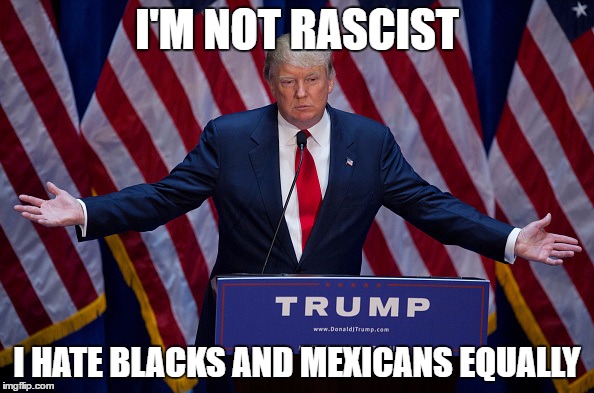
Students who identify with Trump’s hate rhetoric are using it to justify bullying behaviour, persecution of certain students and threats … while immigrant and ethnic minority students across the country are voicing fear, expressing thoughts of suicide and having meltdowns in class.
Some of the stories are heartbreaking. In Tennessee, a kindergarten teacher says a Latino child—told by classmates that he will be deported and trapped behind a wall—asks every day, “Is the wall here yet?”
Some teachers have felt obliged to abandon their customary neutrality on political issues in the classroom and take a stand, despite awareness that doing so may put their jobs in jeapordy.
A Renton, Washington, high school teacher said, “For the first time in my career, I state bluntly what is appropriate conduct for a candidate for this country’s highest office.” She spelled it out for students: “If it can get you suspended from high school, you shouldn’t be espousing it as a candidate.” Another Washington teacher wrote, “This is probably the first time I haven’t been unbiased about it. My students need to know that some of what they are witnessing is not okay.”
In schools where student partisanship leans heavily to one side, educators find themselves needing to speak up for students whose political values are in the minority. “The rhetoric has set up a school community that is hostile to conservatives and the Republican Party,” a Michigan high school teacher said. “It makes it difficult if not impossible to not take sides in my classroom because I can’t be silent in the face of this kind of rhetoric, lest I lose my students’ respect or trust.”
No one can fault an educator who stands up for values like respect, dignity and honesty—values that have long been central to character education and anti-bullying programs. But this year has pushed some educators to go further and take risks. “I have thrown caution into the wind and have spoken out against certain candidates which I have NEVER done,” wrote a Michigan high school teacher, “but I feel it’s my duty to speak out against ignorance!”
These are high-stakes decisions. Several wrote about parents registering complaints when they raised issues of values, fact-checking and critical thinking. But, as one Indianapolis high school teacher put it, “I am a point where I’m going to take a stand even if it costs me my position.”
In Washington state, one high school teacher admitted, “I am teaching off the hook before anyone ‘catches’ me and puts me in a Common Core box; we are reading Howard Zinn, Anne Frank, Haig Bosmajian, Jane Yolen, Ayn Rand, George Orwell and survivors’ testimonies from the Holocaust and the genocides around the world. … I am making it as real and as connected to my students as I can. I feel like I am teaching for our lives.”
The SPLC article focuses on “The Trump Effect” and doesn’t speak to the impact on students of learning that Hillary Clinton called young people of color “superpredators” in a speech. But there is concern sufficient for youth #BlackLivesMatter activist Ashley Williams to have donated $500 to get into a Clinton fundraiser in South Carolina and confront Hillary with a sign reading “I’m not a Superpredator, Hillary!”
There’s also growing discussion about how Hillary and Bill Clinton worked together to formulate and enact the policies and activities which led to an amazing number of black and brown people, and about 1% of the overall US population, being imprisoned in America today.
Hat tip to Yvette Lucas for sharing the article.
